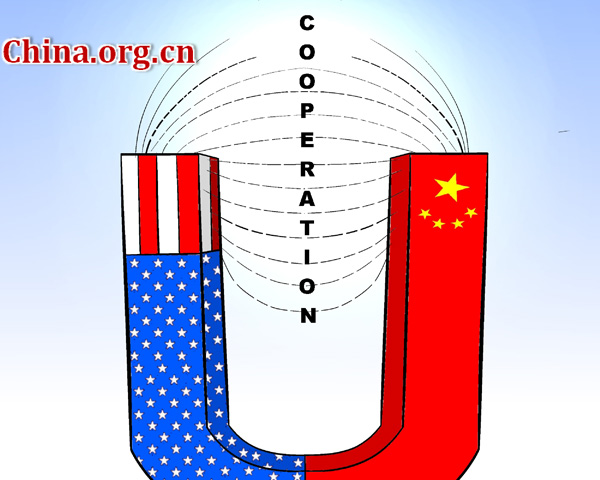Dialogues boost relations between major powers
- By Shen Dingli
 0 Comment(s)
0 Comment(s) Print
Print E-mail China.org.cn, June 23, 2015
E-mail China.org.cn, June 23, 2015
The United States is hosting this year's China-U.S. Strategic and Economic Dialogue, and the China-U.S. High-Level Consultation on People-to-People Exchange in Washington on June 23 and 24.
|
[By Jiao Haiyang/China.org.cn] |
The on-going dialogues are the seventh and sixth rounds, respectively, since U.S. President Barack Obama established these bilateral meetings in 2009. Past rounds have greatly boosted China-U.S. exchanges and cooperation in the realms of security, economics and people-to-people relations.
As the two countries begin a new round of consultations, China and the United States are continuing to broaden and consolidate their cooperation after smoothing out many conflicts in the bilateral relationship. The annual talks will also help explore new routes for cooperation amid U.S. concerns that China's rapid development is becoming a destabilizing factor and the consequent new conflicts between Washington and Beijing that such concerns have instigated.
As usual, this year's strategic dialogue will continue to focus on bilateral, regional and global issues, including those of climate change, antiterrorism measures, nuclear proliferation prevention, wildlife smuggling, cyber security, and tensions on the Korean Peninsula and in the South China Sea. During the economic dialogue, which has adopted the theme "Strengthen strategic dialogue and raise the level of China-U.S. economic cooperation," the two governments will discuss macroeconomic policies, structural reform, the promotion of trade and investment, and how to stabilize and reform the financial market.
The annual dialogues are designed to solve problems by proposing new cooperative measures. Currently, the United States is particularly keen to address three strategic issues: maritime security, cyber security and China's supervision of nongovernmental international agencies operating in China.
The United States has exerted heavy pressure on China's expansion of reef islands in the South China Sea in the name of ensuring free navigation. Senior officials from the U.S. Department of State and the Department of Defense have both made aggressively critical remarks on this issue. The U.S. even sent military aircraft over China's islands to survey China's operations while threatening to dispatch warships into waters within the 12-nautical-mile range of these Chinese islands.
Washington has also accused China of causing a massive data breach of U.S. government databases, but it has failed to present any hard evidence. Additionally, the U.S. is dissatisfied with China's legislation on cyber security and on supervision of nongovernmental international agencies operating in China.






